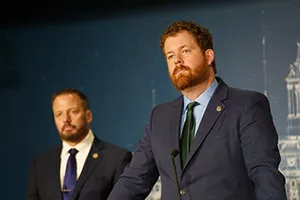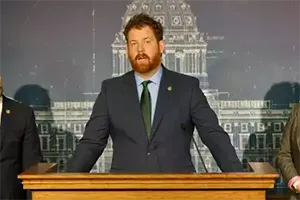 Zack Stephenson, a member of the Minnesota Democratic-Farmer-Labor Party and the Minnesota House of Representatives, has made substantial adjustments to his sports betting bill, HF 2000. It has now advanced to the tax committee. If passed, Stephenson’s amended bill would also authorize wagering on daily fantasy sports, enable the widely popular electronic pull-tab games, and double the tax rate from 10% to 20%.
Zack Stephenson, a member of the Minnesota Democratic-Farmer-Labor Party and the Minnesota House of Representatives, has made substantial adjustments to his sports betting bill, HF 2000. It has now advanced to the tax committee. If passed, Stephenson’s amended bill would also authorize wagering on daily fantasy sports, enable the widely popular electronic pull-tab games, and double the tax rate from 10% to 20%.
The bill’s major author, who has been advocating online sports betting in the past three years, spoke to WCCO Sunday Morning on the potential of legalizing sports betting in Minnesota. Being quite optimistic, he said: “Well, I think momentum is building, I think we have a great chance.” He added that gambling bills are typically challenging, with Democrats and Republicans, who would never vote in favor, so they needed “a broad bipartisan coalition.”
He went on to comment that including the electronic pull-tab games in the amendment of the bill was “a big step forward”, giving a chance to make a difference in many communities. Stephenson also explained that efforts have been concentrated on bringing all the stakeholders together. He said that he has been trying to work with Minnesota’s sovereign tribes, charities, and horse racing tracks. The DFL Party politician confirmed that there was progress resulting from this collaboration.
However, as Senator Jeremy Miller had commented, there was still a lot to be accomplished before the legalization of the sports betting industry became a fact. Stephenson shared his agreement on this, adding that problem gambling was yet another “serious issue” that needed to be tackled.
Zach Stephenson Comments on the Potential Sports Betting Revenue and Its Allocation
 The politician further explained that, if passed, the bill would enable bettors to place wagers via their phones and visit land-based betting casino establishments to make in-person bets. Stephenson also touched upon the question of whether sports betting would be allowed at the horse racing tracks, sharing he did not believe there would be any actual sports betting there.
The politician further explained that, if passed, the bill would enable bettors to place wagers via their phones and visit land-based betting casino establishments to make in-person bets. Stephenson also touched upon the question of whether sports betting would be allowed at the horse racing tracks, sharing he did not believe there would be any actual sports betting there.
Rep. Zach Stephenson also commented on the question of the potentially generated sports betting revenue and its allocation to education and treatment of problem gambling. He said that while the vast majority of people could gamble without any problems whatsoever, the activity could harm vulnerable people. Therefore, resources for education, prevention, and treatment of problem gambling were of essential importance to ensure help for these individuals.
Stephenson said that sports betting should be moved in the right direction, with funds generated from the industry benefiting the state and socially significant causes. He also mentioned the topic of rising juvenile crime, adding that a portion of the sports betting revenue should be directed to youth sports, thus enabling young individuals to “engage with something that makes a positive difference in their life.”
As reported by CasinoGamesPro, the bill that currently moves through the Senate has offered a tax rise to 20% and a ban on live sports bets. Sports betting is now authorized in more than 30 states, including all of Minnesota’s neighboring states. In conclusion, like many supporters of legalizing sports betting, Stephenson shared his hopes that 2024 would be the year he would finally succeed in passing the bill.